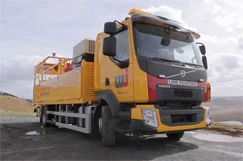A key figure in the sector has acknowledged concerns around switching to Hydrotreated Vegetable Oil (HVO), and said that highways firms should not go out and buy lots more diesel vehicles.
Paul Aldridge, sustainability director at WJ Group, told Road Expo that the firm had 250 trucks and 150 cars and vans across the country and buys three and a half million litres of diesel.
In that context, switching to HVO could significantly cut the company’s Scope 1 and 2 carbon emissions, ‘but there’s problems around HVO’.
He explained: ‘Some parts of the sector think this is a wonderful material to get us to net zero; others less so. So the Environment Agency say, “don’t bring it on our sites”, in England, National Highways say, “do bring it on our sites”.
‘Some of the Tier Ones say, “we don’t want it anywhere near us”; others say, “this is the future”. When you get to the bottom of this, it’s quite complicated.
‘So we have the budget to go and do this [expand HVO] but currently we are looking at how. My personal view is, it’s part of the transition.
'But it shouldn’t be an excuse to go out and buy lots more diesel vehicles. We’re working on it.’
Asked by Highways to elaborate on his concerns about HVO, Mr Aldridge said: ‘It’s complicated. It’s not just about numbers but it’s an ethical and moral dilemma. In some respects, growing crops for fuel is the wrong way of doing it.
‘I think there are ways forward with fuel. We can have electric vehicles, can’t we – and everyone is talking about hydrogen. Those things work. From my point of view, HVO has a role in the transition.'
Invited to state what fuel would eventually be used, Mr Aldridge said that, as well as hydrogen the technology already exists to build a zero emission electric road marking vehicle for use within cities.

